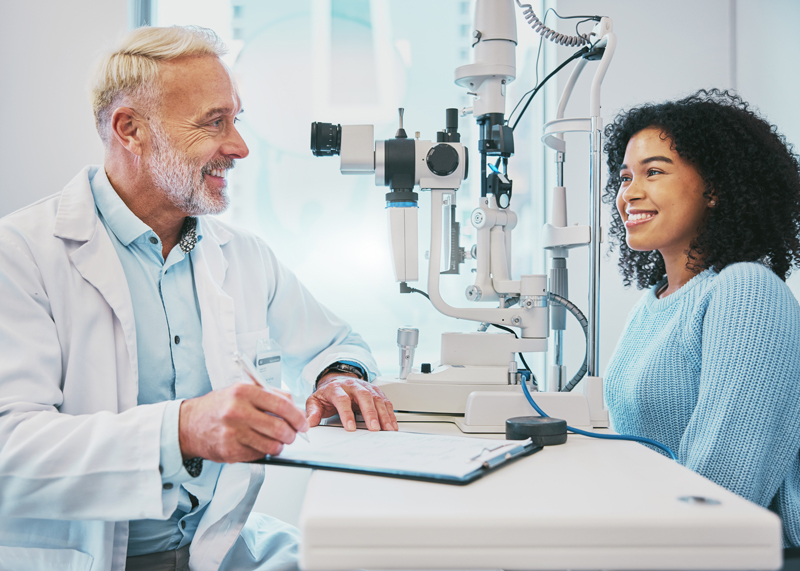Talking to Your Doctor

Key Conversations With Your Doctor: Ensuring Comprehensive Eyecare
When you visit your eye doctor or another eyecare provider, it’s essential to have an open and honest discussions about your eye health, vision concerns and treatment options. Taking a proactive approach to your eyecare can ensure optimal vision health and wellness, and even help prevent some eye conditions from appearing or getting worse.
Discussing your Eye Health
Eyecare Habits: Discuss your daily habits and routines related to eyecare, such as how often you wear contact lenses, your use of digital devices, and your exposure to environmental factors like sunlight and air pollution. Your eye doctor can provide recommendations for optimizing your eye health and reducing your risk of eye strain and fatigue.
Eye Protection: If you participate in sports or activities that pose a risk of eye injury, such as racquetball, basketball, or woodworking, discuss the importance of eye protection with your eye doctor. They can recommend appropriate safety eyewear to prevent injuries and preserve your vision.
Eye Health History: Provide your eye doctor with a comprehensive history of your eye health, including any past eye surgeries, injuries, or treatments. Additionally, disclose any systemic health conditions, such as diabetes or hypertension, that may impact your eye health.
Family History: Discuss your family history of eye diseases, such as glaucoma, macular degeneration, or cataracts. Family history can influence your risk of developing certain eye conditions, so it’s essential for your eye doctor to be aware of any potential genetic factors.
Current Medications: Inform your eyecare provider about any prescription medications, over-the-counter drugs, or supplements you’re currently taking. Some medications can affect your vision or increase your risk of eye-related side effects, so your eye doctor needs to consider these factors when evaluating your eye health.


Discussing Vision Concerns and Treatment Options
If you’re considering vision correction options, such as glasses, contact lenses, or refractive surgery, don’t be afraid to discuss your preferences and expectations with your eye doctor. They can help you explore the pros and cons of each option and determine the best solution for your individual needs.
It’s important to relay any recent changes to your vision as well, such as blurry vision, double vision, or difficulty seeing at night. These changes could indicate underlying eye conditions that require evaluation and treatment.
Establish a plan for ongoing eye care and follow-up appointments based on your eye health needs and treatment goals. Regular check-ups are essential for monitoring changes in your vision and detecting any signs of eye disease or dysfunction early on.
